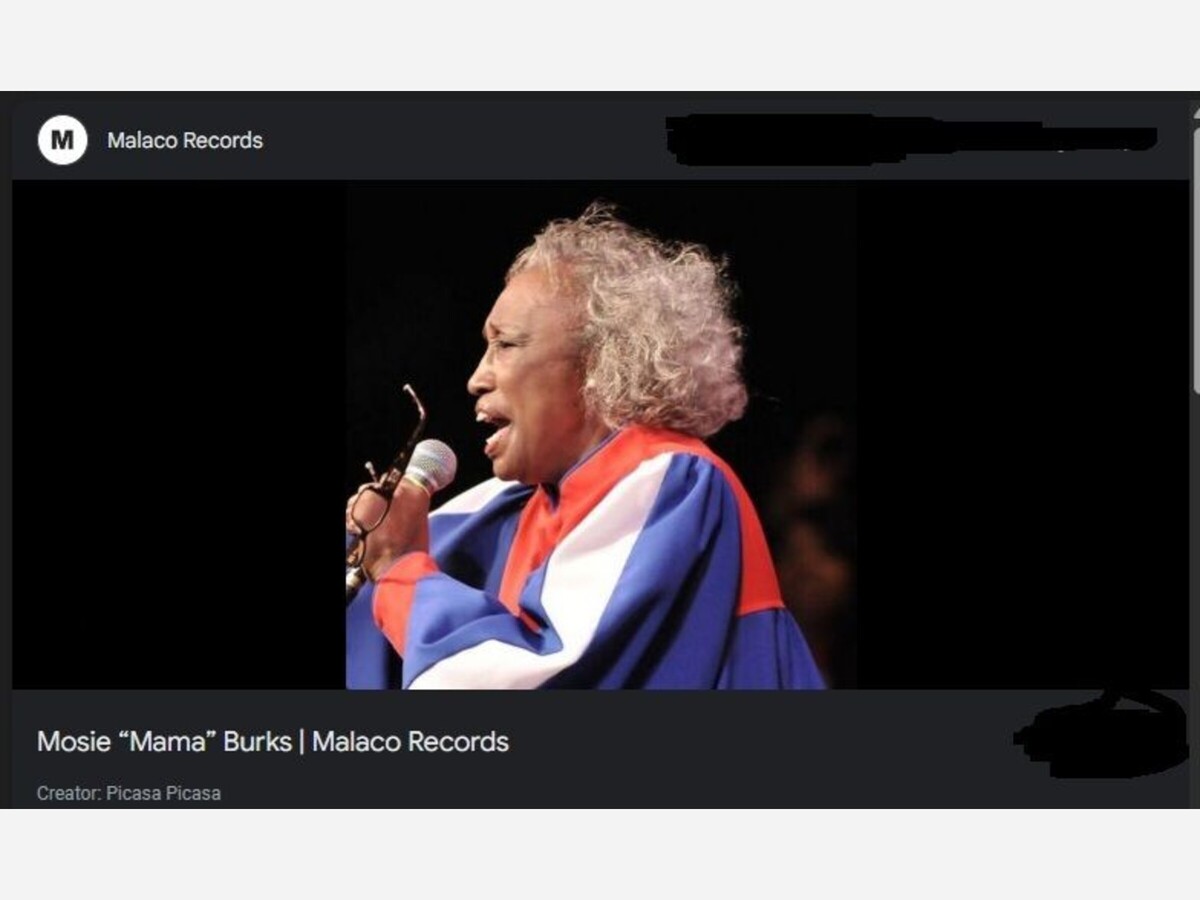Image


WE'LL SEE YOU IN THE MORNING.
With a life story suitable for a screenplay, Mosie Burks was born on June 17, 1933, into a large migrant farming family in Forest, Mississippi. As a child, she helped her parents pick cotton to make a living, but she was delivered from fieldwork after she kept passing out from the intense Mississippi sun.
Early on, she drew inspiration from the singing of Mahalia Jackson and guitar-toting evangelist Sister Rosetta Tharpe—so much so that she took up the guitar at age 12, playing for her local Church of God in Christ.
Burks moved to Jackson, Mississippi, as a young adult, and cleaned houses to raise money to attend Jackson State University. Her higher education plans were shelved, however, when her mother died at age 40, and her father left several of the family’s youngest children in Burks’ care. She worked as a maid to take care of her siblings. In her mid-20s, Burks married, started her own family and reprised her higher education aspirations by studying voice at Tougaloo College.
Once again, tragedy interrupted her education pursuit when her husband was the victim of a hit-and-run accident and became seriously ill, requiring healthcare for years (he died in 1984). She returned to the workforce, gaining employment with the South Central Bell Telephone Company. Her singing was relegated to Jackson churches, where she became a popular soloist.
Frank Williams tried to recruit Burks to join his Mississippi Mass Choir, but she wasn’t interested. She was looking forward to retiring from the phone company and traveling the country with her new husband, Willie, whom she married in 1992. After Williams died in 1993, his widow, Katrina, persuaded Burks to join the choir, in part by offering Willie a spot selling choir merchandise during their tours so the Burks could travel together.
Mosie’s voice, honed from decades of fiery church singing, was ideal. She became the choir’s go-to soloist for its roof-raising traditional fare, such as This Morning When I Rose, They Got the Word and I Love to Praise Him.
she recorded her first solo album.
Mama Burks was released by Malaco in 2005 and featured appearances by the Mississippi Mass Choir and the legendary Dorothy Norwood.
The year prior, Burks was featured in America’s Heart & Soul, a Disney film about everyday heroes. She has traveled the world with the Mississippi Mass Choir, sung for the Pope and can rightly assert as a truism the title of a song from her solo album: “God Has Brought Me from a Mighty Long Way.”
—Robert M. Marovich, MALACO MUSIC GROUP
Although steeped in the gospel quartet tradition, Frank Williams of the Jackson Southernaires had such a great experience singing lead with the Florida Mass Choir on its 1987 Malaco Records release, Let the Holy Ghost Lead You, that he thought, “Why not gather the best voices from Mississippi into a mass choir for the Magnolia State?”
Williams shared his vision with Malaco executive Jerry Mannery, who gave him the green light to assemble the choir. First, Williams recruited David R. Curry as music director. He then invited the Reverend Benjamin Cone Jr. to be the choir’s spiritual director. Cone agreed on the condition that the choir extends an invitation of discipleship on every recording and concert.
After open auditions and months of rehearsals, the Mississippi Mass Choir recorded its debut album for Malaco on October 29, 1988, at the Jackson Municipal Auditorium. In addition to the thunderous auditorium-filling harmonies of the 100-voice choir, the album benefited from appearances by the Reverends Milton Biggham and James Moore, and Williams’ brother Huey as guest vocalists. The self-titled debut hit No. 1 on the Billboard Top Gospel Albums chart and set a gospel industry record for most consecutive weeks on the albums chart (45). It received four Stellar Awards as well as Dove and Soul Train Award nominations. The group was named Contemporary Choir of the Year and Best New Traditional Artist by the Gospel Music Workshop of America.
The follow-up album, God Gets the Glory (Malaco, 1991), was recorded at the Mississippi Coliseum in Jackson and followed the sonic formula of the debut: enthusiastic choral singing coupled with strong soloists and songs with traditional roots. Notable numbers were the two-part The Lord Keeps Blessing Me and the Darius Brooks-Margaret Douroux composition What Shall I Render.
The choir’s third release, It Remains to Be Seen, debuted on the Billboard Top Gospel Albums chart at No. 5 and topped it for a year, receiving a Soul Train Music Award as Best Gospel Album of 1994. The National Association of Recording Manufacturers named it the top seller in gospel music. Writing in Billboard, Lisa Collins noted that in just five years, the Mississippi Mass Choir had become “the preeminent force on gospel’s choir scene,” selling nearly 700,000 units for Malaco. But the accolades were bittersweet; It Remains to Be Seen turned out to be the last recording to feature founder Frank Williams, who passed away in March 1993.
The 1990s and 2000s found the choir touring the country and, fueled by more than 125 voices, producing more albums for Malaco. One of the most popular albums of this period was 1999’s Emmanuel: God with Us, featuring He Can Fix What’s Broke and the Mama Burks–led They Got the Word.
In 2008, the Mississippi Mass Choir recognized its 20th anniversary with a special live recording and companion DVD called The First Twenty Years. Its songs represented two decades of ministry and included titles such as Near the Cross and They Got the Word.
Credit to: THE LAST SOUL COMPANY
-30-